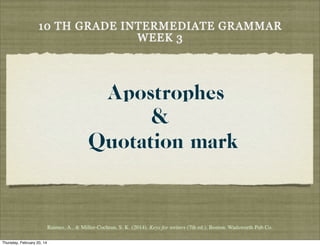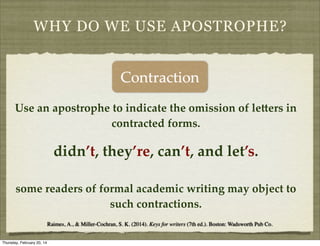Week 3 apostrophe and "" mark
- 1. 10 TH GRADE INTERMEDIATE GRAMMAR WEEK 3 Apostrophes & Quotation mark Raimes,┬ĀA., & Miller-Cochran,┬ĀS.┬ĀK. (2014). Keys for writers (7th┬Āed.). Boston: Wadsworth Pub Co. Thursday, February 20, 14
- 2. WHAT IS AN APOSTROPHE? Apostrophe looks like comma but we use it above the line of writing. Raimes,┬ĀA., & Miller-Cochran,┬ĀS.┬ĀK. (2014). Keys for writers (7th┬Āed.). Boston: Wadsworth Pub Co. Thursday, February 20, 14
- 3. WHY DO WE USE APOSTROPHE? Possession To ┬Āindications ┬Āownership ┬Āor ┬Āpossession. FredŌĆÖs ┬Ābooks the ┬ĀgovernmentŌĆÖs ┬Āplans a ┬ĀyearŌĆÖs ┬Āpay (the ┬Ābooks ┬Ābelonging ┬Āto ┬ĀFred, ┬Āthe ┬Āplans ┬Āof ┬Āthe ┬Āgovernment, ┬Āthe ┬Āpay ┬Āfor ┬Āa ┬Āyear) Raimes,┬ĀA., & Miller-Cochran,┬ĀS.┬ĀK. (2014). Keys for writers (7th┬Āed.). Boston: Wadsworth Pub Co. Thursday, February 20, 14
- 4. POSSESSION Use ┬ĀŌĆōŌĆśs ┬Āfor ┬Āthe ┬Āpossessive ┬Āform ┬Āof ┬Āall ┬Ānouns ┬Āexcept ┬Ā plural ┬Ānouns ┬Āthat ┬Āend ┬Āwith ┬ĀŌĆōs: the ┬ĀheroŌĆÖs ┬Āmisfortunes, ┬Āthe ┬ĀnationŌĆÖs ┬Ācapital, ┬Āthe ┬ĀpeopleŌĆÖs ┬Āadvocate. Use ┬Āan ┬Āapostrophe ┬Āalone ┬Āfor ┬Āthe ┬Āpossessive ┬Āform ┬Ā of ┬Āplural ┬Ānouns ┬Āthat ┬Āend ┬Āwith ┬ĀŌĆōs the ┬ĀheroesŌĆÖ ┬Āmisfortunes, ┬Āthe ┬ĀstatesŌĆÖ ┬Āgovernors, ┬Āliberal ┬ĀpoliticiansŌĆÖ ┬Āe’¼Ćorts. Raimes,┬ĀA., & Miller-Cochran,┬ĀS.┬ĀK. (2014). Keys for writers (7th┬Āed.). Boston: Wadsworth Pub Co. Thursday, February 20, 14
- 5. POSSESSION When ┬Āto ┬Āuse-┬ŁŌĆÉŌĆæŌĆśs ┬Āto ┬Āsingle ┬Āpossession: With ┬Āindividual ┬Āand ┬Ājoint ┬Āownership With ┬Ācompound ┬Ānouns With ┬Āsingular ┬Āproper ┬Ānouns ┬Āending ┬Āin ┬ĀŌĆōs In ┬Āall ┬Āwords ┬Āthat ┬Āneed ┬Āan ┬Āapostrophe ┬Āto ┬Āsingle ┬Āpossession Use ┬Āonly ┬Āan ┬Āapostrophe ┬Āto ┬Āsingle ┬Āpossession ┬Āin ┬Āplural ┬Ānouns ┬Āalready ┬Āending ┬Āin ┬ĀŌĆōs Use ┬Āan ┬Āapostrophe ┬Āin ┬Ācontractions Two ┬Āoccasions ┬Āto ┬Āuse ┬Ā ┬Ā-┬ŁŌĆÉŌĆæŌĆśs ┬Āto ┬Āform ┬Āa ┬Āplural Use ┬Ā-┬ŁŌĆÉŌĆæŌĆśs ┬Āfor ┬Āthe ┬Āplural ┬Āform ┬Āof ┬ĀleIers ┬Āof ┬Āthe ┬Āalphabet Use ┬ĀŌĆōŌĆśs ┬Āfor ┬Āthe ┬Āplural ┬Āform ┬Āof ┬Āa ┬Āword ┬Āreferred ┬Āto ┬Āas ┬Āthe ┬Āword ┬Āitself Raimes,┬ĀA., & Miller-Cochran,┬ĀS.┬ĀK. (2014). Keys for writers (7th┬Āed.). Boston: Wadsworth Pub Co. Thursday, February 20, 14
- 6. WHY DO WE USE APOSTROPHE? Contraction Use ┬Āan ┬Āapostrophe ┬Āto ┬Āindicate ┬Āthe ┬Āomission ┬Āof ┬Āle2ers ┬Āin ┬Ā contracted ┬Āforms. ┬Ā didnŌĆÖt, ┬ĀtheyŌĆÖre, ┬ĀcanŌĆÖt, ┬Āand ┬ĀletŌĆÖs. some ┬Āreaders ┬Āof ┬Āformal ┬Āacademic ┬Āwriting ┬Āmay ┬Āobject ┬Āto ┬Ā such ┬Ācontractions. Raimes,┬ĀA., & Miller-Cochran,┬ĀS.┬ĀK. (2014). Keys for writers (7th┬Āed.). Boston: Wadsworth Pub Co. Thursday, February 20, 14
- 7. DONŌĆÖT USE 1. ┬Ā ┬ĀGenerally, ┬Ādo ┬Ānot ┬Āuse ┬Āan ┬Āapostrophe ┬Āto ┬Āform ┬Āthe ┬Āplurals ┬Āof ┬Ānouns ┬Ā(see ┬Ā46). 2. ┬Ā ┬ĀNever ┬Āuse ┬Āan ┬Āapostrophe ┬Ābefore ┬Āan ┬ĀŌĆōs ┬Āending ┬Āon ┬Āa ┬Āverb. ┬ĀNote ┬Āthat ┬ĀletŌĆÖs ┬Āis ┬Āa ┬Ā contracted ┬Āform ┬Āfor ┬Ālet ┬Āus; ┬Āthe ┬ĀŌĆōs ┬Āis ┬Ānot ┬Āa ┬Āverb ┬Āending. 3. ┬Ā ┬ĀDo ┬Ānot ┬Āwrite ┬Āpossessive ┬Āpronouns(hers, ┬Āits, ┬Āours, ┬Āyours, ┬Ātheirs) ┬Āwith ┬Āan ┬Ā ┬Ā apostrophe. 4. ┬Ā ┬ĀDo ┬Ānot ┬Āuse ┬Āan ┬Āapostrophe ┬Āto ┬Āform ┬Āthe ┬Āplural ┬Āof ┬Ānames ┬Āor ┬Ānumbers: ┬Āthe ┬ĀBrowns; ┬Ā the ┬Ā1990s[not ┬Ā1990ŌĆÖs]; ┬Āthe ┬ĀŌĆÖ90s ┬Ā[not ┬Ā0ŌĆÖs]. 5. ┬Ā ┬ĀWith ┬Āinanimate ┬Āobjects ┬Āand ┬Āconcepts, ┬Āof ┬Āis ┬Āoften ┬Āpreferred ┬Āto ┬Āan ┬Āapostrophe: ┬Ā the ┬Ācost ┬Āof ┬Āservice, ┬Āthe ┬Ātop ┬Āof ┬Āthe ┬Āmountain, ┬Āthe ┬Āback ┬Āof ┬Āthe ┬Ādesk. Raimes,┬ĀA., & Miller-Cochran,┬ĀS.┬ĀK. (2014). Keys for writers (7th┬Āed.). Boston: Wadsworth Pub Co. Thursday, February 20, 14
- 8. QUOTATION MARKS Use quotation marks [ ŌĆ£ ŌĆØ ] to set off material that represents quoted or spoken language. Quotation marks also set off the titles of things that do not normally stand by themselves: short stories, poems, and articles. Usually, a quotation is set off from the rest of the sentence by a comma. Capital Community College Foundation (n.d.). Quotation Marks. Retrieved from http://grammar.ccc.commnet.edu/grammar/marks/quotation.htm Thursday, February 20, 14
- 9. QUOTATION MARKS RULES Quote ┬Āexactly ┬Āthe ┬Āwords ┬Āused ┬Āby ┬Āthe ┬Āoriginal ┬Āspeaker ┬Āor ┬Āwriter. Pair ┬Āopening ┬Āquotation ┬Āmarks ┬Āwith ┬Āclosing ┬Āquotation ┬Āmarks ┬Āto ┬Āindicate ┬Ā where ┬Āthe ┬Āquotation ┬Āends ┬Āand ┬Āyour ┬Āideas ┬Ābegin. Use ┬Ācorrect ┬Āpunctuation ┬Āto ┬Āintroduce ┬Āand ┬Āend ┬Āa ┬Āquotation, ┬Āand ┬Āplace ┬Āother ┬Ā marks ┬Āof ┬Āpunctuation ┬Ācarefully ┬Āin ┬Ārelation ┬Āto ┬Āthe ┬ĀQuotation ┬Āmarks. Enclose ┬Āthe ┬Ātitles ┬Āof ┬Āarticles, ┬Āshort ┬Āstories, ┬Āsongs, ┬Āand ┬Āpoems ┬Āin ┬ĀQuotation ┬Ā marks. Enclose ┬Āany ┬Āadded ┬Āor ┬Āchanged ┬Āmaterial ┬Āin ┬Āsquare ┬Ābrackets. Raimes,┬ĀA., & Miller-Cochran,┬ĀS.┬ĀK. (2014). Keys for writers (7th┬Āed.). Boston: Wadsworth Pub Co. Thursday, February 20, 14
- 10. QUOTATION MARKS RULES After ┬Āan ┬Āintroductory ┬Āverb, ┬Āsuch ┬Āas ┬Āsay, ┬Āstate, ┬Āor ┬Āwrite, ┬Āuse ┬Āa ┬Ācomma ┬Ā followed ┬Āby ┬Āa ┬Ācapital ┬ĀleIer ┬Āto ┬Āintroduce ┬Āa ┬Ādirect ┬Āquotation. Use ┬Āa ┬Ācolon ┬Āafter ┬Āa ┬Ācomplete ┬Āsentence ┬Āintroducing ┬Āa ┬Āquotation, ┬Āand ┬Ābeing ┬Ā the ┬Āquotation ┬Āwith ┬Āa ┬Ācapital ┬ĀleIer When ┬Āa ┬Āquotation ┬Āis ┬Āintegrated ┬Āinto ┬Āthe ┬Āstructure ┬Āof ┬Āyour ┬Āown ┬Āsentence, ┬Ā use ┬Āno ┬Āspecial ┬Āintroductory ┬Āpunctuation ┬Āother ┬Āthan ┬Āquotation ┬Āmarks Raimes,┬ĀA., & Miller-Cochran,┬ĀS.┬ĀK. (2014). Keys for writers (7th┬Āed.). Boston: Wadsworth Pub Co. Thursday, February 20, 14
- 11. Thursday, February 20, 14







![DONŌĆÖT USE
1. ┬Ā ┬ĀGenerally, ┬Ādo ┬Ānot ┬Āuse ┬Āan ┬Āapostrophe ┬Āto ┬Āform ┬Āthe ┬Āplurals ┬Āof ┬Ānouns ┬Ā(see ┬Ā46).
2. ┬Ā ┬ĀNever ┬Āuse ┬Āan ┬Āapostrophe ┬Ābefore ┬Āan ┬ĀŌĆōs ┬Āending ┬Āon ┬Āa ┬Āverb. ┬ĀNote ┬Āthat ┬ĀletŌĆÖs ┬Āis ┬Āa ┬Ā
contracted ┬Āform ┬Āfor ┬Ālet ┬Āus; ┬Āthe ┬ĀŌĆōs ┬Āis ┬Ānot ┬Āa ┬Āverb ┬Āending.
3. ┬Ā ┬ĀDo ┬Ānot ┬Āwrite ┬Āpossessive ┬Āpronouns(hers, ┬Āits, ┬Āours, ┬Āyours, ┬Ātheirs) ┬Āwith ┬Āan ┬Ā ┬Ā
apostrophe.
4. ┬Ā ┬ĀDo ┬Ānot ┬Āuse ┬Āan ┬Āapostrophe ┬Āto ┬Āform ┬Āthe ┬Āplural ┬Āof ┬Ānames ┬Āor ┬Ānumbers: ┬Āthe ┬ĀBrowns; ┬Ā
the ┬Ā1990s[not ┬Ā1990ŌĆÖs]; ┬Āthe ┬ĀŌĆÖ90s ┬Ā[not ┬Ā0ŌĆÖs].
5. ┬Ā ┬ĀWith ┬Āinanimate ┬Āobjects ┬Āand ┬Āconcepts, ┬Āof ┬Āis ┬Āoften ┬Āpreferred ┬Āto ┬Āan ┬Āapostrophe: ┬Ā
the ┬Ācost ┬Āof ┬Āservice, ┬Āthe ┬Ātop ┬Āof ┬Āthe ┬Āmountain, ┬Āthe ┬Āback ┬Āof ┬Āthe ┬Ādesk.
Raimes,┬ĀA., & Miller-Cochran,┬ĀS.┬ĀK. (2014). Keys for writers (7th┬Āed.). Boston: Wadsworth Pub Co.
Thursday, February 20, 14](https://image.slidesharecdn.com/week3apostroheandqmark-140220195137-phpapp01/85/Week-3-apostrophe-and-mark-7-320.jpg)
![QUOTATION MARKS
Use quotation marks [ ŌĆ£ ŌĆØ ] to set off material that
represents quoted or spoken language. Quotation
marks also set off the titles of things that do not
normally stand by themselves: short stories, poems,
and articles. Usually, a quotation is set off from the
rest of the sentence by a comma.
Capital Community College Foundation (n.d.). Quotation Marks. Retrieved from http://grammar.ccc.commnet.edu/grammar/marks/quotation.htm
Thursday, February 20, 14](https://image.slidesharecdn.com/week3apostroheandqmark-140220195137-phpapp01/85/Week-3-apostrophe-and-mark-8-320.jpg)


